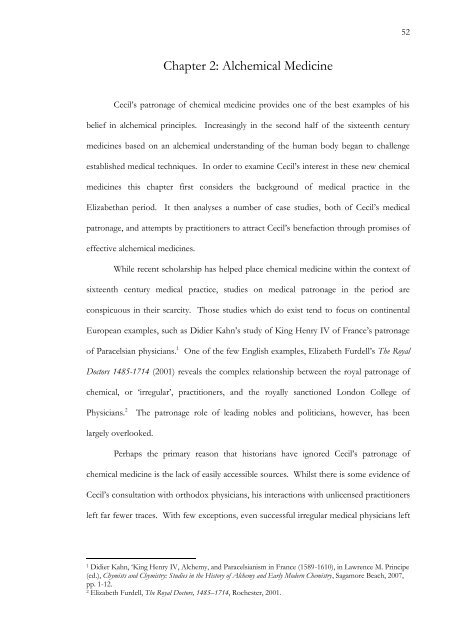The Alchemical Patronage of Sir William Cecil, Lord Burghley
The Alchemical Patronage of Sir William Cecil, Lord Burghley
The Alchemical Patronage of Sir William Cecil, Lord Burghley
Create successful ePaper yourself
Turn your PDF publications into a flip-book with our unique Google optimized e-Paper software.
Chapter 2: <strong>Alchemical</strong> Medicine<br />
<strong>Cecil</strong>‘s patronage <strong>of</strong> chemical medicine provides one <strong>of</strong> the best examples <strong>of</strong> his<br />
belief in alchemical principles. Increasingly in the second half <strong>of</strong> the sixteenth century<br />
medicines based on an alchemical understanding <strong>of</strong> the human body began to challenge<br />
established medical techniques. In order to examine <strong>Cecil</strong>‘s interest in these new chemical<br />
medicines this chapter first considers the background <strong>of</strong> medical practice in the<br />
Elizabethan period. It then analyses a number <strong>of</strong> case studies, both <strong>of</strong> <strong>Cecil</strong>‘s medical<br />
patronage, and attempts by practitioners to attract <strong>Cecil</strong>‘s benefaction through promises <strong>of</strong><br />
effective alchemical medicines.<br />
While recent scholarship has helped place chemical medicine within the context <strong>of</strong><br />
sixteenth century medical practice, studies on medical patronage in the period are<br />
conspicuous in their scarcity. Those studies which do exist tend to focus on continental<br />
European examples, such as Didier Kahn‘s study <strong>of</strong> King Henry IV <strong>of</strong> France‘s patronage<br />
<strong>of</strong> Paracelsian physicians. 1 One <strong>of</strong> the few English examples, Elizabeth Furdell‘s <strong>The</strong> Royal<br />
Doctors 1485-1714 (2001) reveals the complex relationship between the royal patronage <strong>of</strong><br />
chemical, or ‗irregular‘, practitioners, and the royally sanctioned London College <strong>of</strong><br />
Physicians. 2 <strong>The</strong> patronage role <strong>of</strong> leading nobles and politicians, however, has been<br />
largely overlooked.<br />
Perhaps the primary reason that historians have ignored <strong>Cecil</strong>‘s patronage <strong>of</strong><br />
chemical medicine is the lack <strong>of</strong> easily accessible sources. Whilst there is some evidence <strong>of</strong><br />
<strong>Cecil</strong>‘s consultation with orthodox physicians, his interactions with unlicensed practitioners<br />
left far fewer traces. With few exceptions, even successful irregular medical physicians left<br />
1 Didier Kahn, ‗King Henry IV, Alchemy, and Paracelsianism in France (1589-1610), in Lawrence M. Principe<br />
(ed.), Chymists and Chymistry: Studies in the History <strong>of</strong> Alchemy and Early Modern Chemistry, Sagamore Beach, 2007,<br />
pp. 1-12.<br />
2 Elizabeth Furdell, <strong>The</strong> Royal Doctors, 1485–1714, Rochester, 2001.<br />
52















